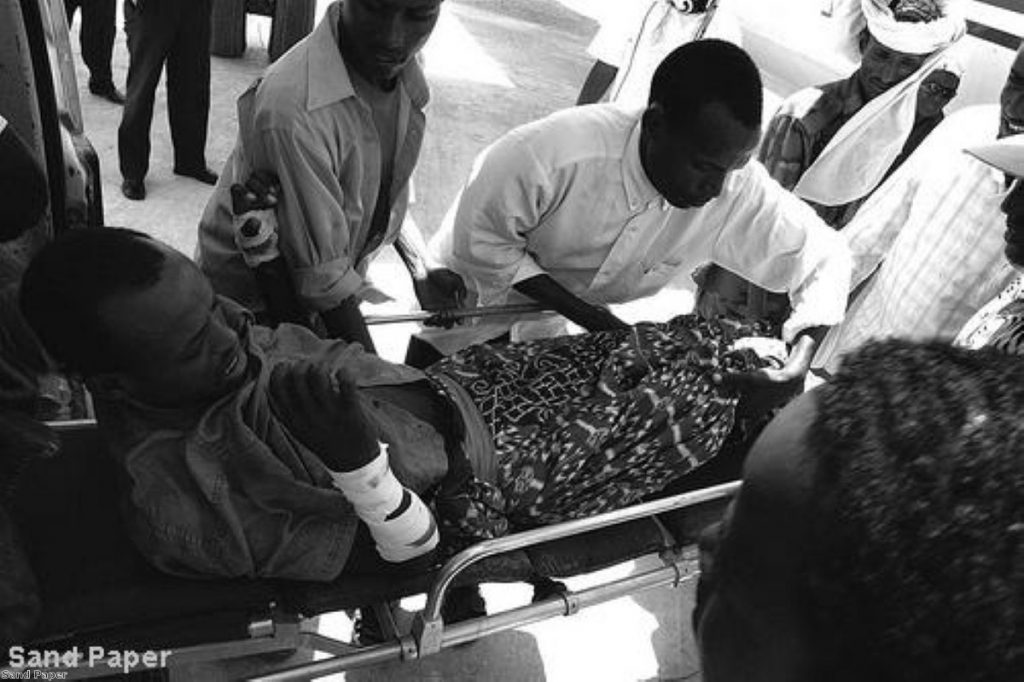Immigrant Stories: The secret deportation programme to Somalia
Updated: See below
We're not supposed to be returning people to Somalia.
The Home Office has guidance saying no safe return is possible. A European court of human rights judgement found doing so would be a violation of Article 3, which prohibits inhuman or degrading treatment.
Terror group Al-Shabaab says any Somalian returned from the West will be treated as someone who gave up their religion, making them a legitimate military target.


They "will be killed and fought against in the same manner" as the government, Al-Shabaab commander Ali Mohamed Hussein said.
"They are working for the infidels, and since they are working for the infidels, they are the same as the infidels they are working for as far as we are concerned."
There is no such thing as safe return to Mogadishu.
And yet a few weeks ago, Anis (not his real name) was detained, sent to Morton Hall detention centre and told he was going to be sent back.
"I said: 'Please don't send me there. I'll be killed if I get sent there. If you're going to send me to Mogadishu just kill me here'," he tells me over the phone.
"No-one in the Somali community believed me. They said: 'It's impossible to send Somali asylum seekers back. They can't remove you. Don't worry. The world knows it's very dangerous'."
They were wrong. The Home Office has been desperate to start removals back to Somalia. Now, as reports emerge of asylum seekers suddenly being detained when they report in to the department, it appears they have got their wish.
"They came in the early morning," Anis says.
"They said: 'You are going. You have to be ready'. I said no.
"They forced me. They put handcuffs on me. There were three guys – one holding my right arm, one holding my left arm and another in front of me. They forced me into the van."
The van skipped the airport building altogether and drove straight on to the tarmac. It came to stop directly underneath a Turkish Airlines flight heading to Istanbul. As the passengers were boarding, Anis was smuggled on through the food preparation area.
"They put me in a back seat," he says. "The passengers could see me and I could see them. I was shouting, screaming – crying and crying. One of the men sat on my left and the other on my right."
Once the plane landed in Istanbul, Anis and his minders were met by a Turkish immigration official.
"I said to him: 'I'm voiceless. Can I talk to you? No one listens to my voice'. He ignored me."
They had a few hours to spare before the flight to Mogadishu. The UKBA officers wanted Anis placed in a cell in the airport so they could go out into Istanbul and see the sites. But just before they left, one of their phones rang.
"When he finished the phone call he said the plan changed – we were going back to London," Amis explains. "The judicial review came through."
Two days before the flight Anis had been allowed a solicitor. It was too late to stop the removal, but he managed to secure the judicial review with just hours to spare before the flight to Mogadishu.
"We stayed for half an hour and then flew back to Heathrow," he says.
Now he's back in the UK, but still in a detention centre waiting to be removed. As I speak to him, he explains how members of his minority clan are targets of Al-Shabaab."My solicitor asked for a temporary release. They said no," he says, his voice sounding increasingly tired and hopeless.
"They said they'll remove me soon as possible. I am so scared and so overwhelmed. I am having nightmares.
"When you are forced onto the plane…" There's a long pause. He breathes heavily down the phone. "When people are forcing you to go back to a place where you're going to die…" Another pause. This one feels very long. Then very quietly he says: "I am having some sort of torture in my brain."
Anis is still in the detention centre, awaiting removal to Somalia. This is his immigrant story.
Update 16/05/14
Anis has now been taken to Dover detention centre and given removal papers. His legal avenues have mostly failed, although an appeal has been made to the European Court of Human Rights. His case has received considerable attention in the Somali media, something which puts him at even greater risk back home. Anis believes he is being treated as a test case, not just by the British government trying to re-start deportations to Somalia, but also by terror group Al-Shabaab, who are planning violent reprisals against anyone returned from the West.

